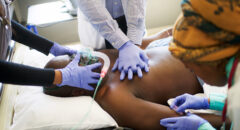
Studies show that Black Americans are more prone to have heart-related issues than other ethnicities. They’re also more likely to develop other chronic illnesses like diabetes that can lead to heart disease. To make matters worse, Black men, in particular, don’t see the doctor as often as they should even though they practice poor lifestyle choices at a higher rate. If you want to keep your heart healthy, seeing your doctor regularly is good.
How Often To See Your Doctor
Though most people assume there’s no need to discuss your heart with the doctor unless something is wrong, health experts recommend starting heart screenings by age 20. Depending on the test, These should be done every two to six years. If you have a higher risk of heart disease than others, it may need to be done more often.
RELATED: How To Check Your Blood Pressure At Home
The Types Of Tests You May Need
Most of the heart health tests aren’t invasive. For example, you should start getting your blood pressure, cholesterol levels, body mass index, and waist circumference checked at 20. At 45, your doctor will likely add blood glucose level checks. If those checks have abnormal results, you’ll need further examination. A few of the tests your doctor may recommend in that case are electrocardiography (ECG), cardiac stress test, echocardiography, cardiac CT scan, and nuclear stress test.
In electrocardiography, electrodes are placed on your chest so a machine can record information about your heart’s electrical activity, rate, and rhythm. When you’re doing a cardiac stress test, a health professional will assess your heart’s response to physical activity like walking or running on a treadmill. With echocardiography, you’ll have your heart assessed with an ultrasound. The images will be used to determine how well your heart’s valves are functioning. This may be done before and after a strenuous activity.
If your doctor requests a cardiac CT scan, you can expect to be placed under a CT scanner while electrodes are attached to your chest. This exam is meant to capture images of your heart that will show if there’s any buildup of plaque in your arteries. Finally, a nuclear stress test is used to check how well blood is flowing from your heart.
How To Get Screened For Free
Depending on what you need, a heart screening can cost hundreds of dollars. Fortunately, there are ways to get checked for free. Your first option is to find a federal health center in the area as many of them will offer heart screenings for free. Another way to access free heart screenings is at pharmacies or private organizations that have special events for February because it’s National Heart Health Month.
Additionally, the American Heart Association will often partner with different hospitals or health centers to increase awareness of heart disease. During these collaborations, they may offer free health screenings so it’s good to look out for them. Finally, private companies, charity organizations, or community centers may offer free health screenings for certain people at different times. For example, they may focus on people in a specific income bracket, minorities, or older adults.
How To Check Your Heart Health At Home
While it’s best to get assessed by your doctor, there are ways to check on your heart at home. Once you have access to an online conversion chart, you can calculate your BMI using your weight. You can also buy a home blood pressure monitor and a glucose monitor to track your blood pressure and blood glucose levels respectively. If you want to check your heart rate and rhythm, a fitness tracker or another kind of wearable device can help. The information from these devices can be helpful when talking to your doctor about changes in your health.
As a Black man, you have a higher risk of being diagnosed with heart problems. The good news is that you can stay on top of your heart health by undergoing regular heart screenings. It can also help to track your heart’s health at home.

Medically Reviewed By:
Dr. William A. Cooper
William A. Cooper is the former founding Medical Director of Cardiovascular Surgery at WellStar Health Systems in Marietta, Georgia, and Associate Professor of surgery at Emory University in Atlanta, Georgia.








